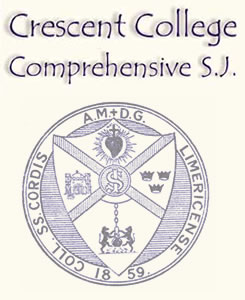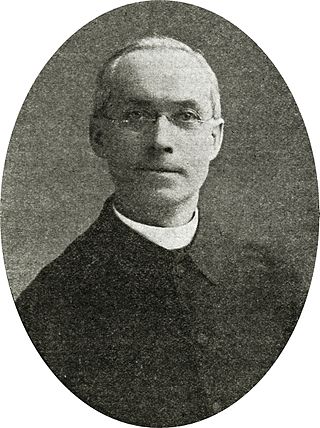Related Research Articles

The Society of Jesus, also known as the Jesuit Order or the Jesuits, is a religious order of clerics regular of pontifical right for men in the Catholic Church headquartered in Rome. It was founded in 1540 by Ignatius of Loyola and six companions, with the approval of Pope Paul III. The society is engaged in evangelization and apostolic ministry in 112 nations. Jesuits work in education, research, and cultural pursuits. Jesuits also conduct retreats, minister in hospitals and parishes, sponsor direct social and humanitarian ministries, and promote ecumenical dialogue.

Francis-Xavier de Montmorency-Laval, commonly referred to as François de Laval, was a French prelate of the Catholic Church. Consecrated a bishop in 1658, he led the Apostolic Vicariate of New France from 1658 to 1674 and then became the first bishop of the Diocese of Quebec from its erection in 1674 until he retired because of poor health in 1688. He continued to work in New France until his death in 1708. Among his accomplishments was the founding of the Séminaire de Québec in 1663. Laval was a member of the Montmorency family, but renounced his rights as heir so he could pursue his ecclesiastical career.
A pontifical university is an ecclesiastical university established or approved directly by the Holy See, composed of three main ecclesiastical faculties and at least one other faculty. These academic institutes deal specifically with Christian revelation and related disciplines, and the Church's mission of spreading the Gospel, as proclaimed in the apostolic constitution Sapientiachristiana. As of 2018, they are governed by the apostolic constitution Veritatis gaudium issued by Pope Francis on 8 December 2017.

The Catholic Church in Thailand is part of the worldwide Catholic Church, under the spiritual leadership of the Pope in Rome.


Crescent College Comprehensive SJ, formerly known as the College of the Sacred Heart, is a Catholic secondary school located on 40 acres (160,000 m2) of parkland at Dooradoyle, Limerick, Ireland. The college is one of a number of Jesuit schools in Ireland.

The Society of Foreign Missions of Paris is a Catholic missionary organization. It is not a religious institute, but an organization of secular priests and lay persons dedicated to missionary work in foreign lands.
Mungret College was a Jesuit apostolic school and a lay secondary school near Limerick, Ireland. Located on the western outskirts of the modern-day suburban town of Raheen, it was operational from 1882 until 1974 when it closed as a school for the last time. The college produced over 1000 priests in that period. It had previously been an agricultural college and a Limerick diocesan seminary until 1888.
Jérôme Lalemant, S.J. was a French Jesuit priest who was a leader of the Jesuit mission in New France.

The Diocese of Jaffna is a Latin Church ecclesiastical territory or diocese of the Catholic Church in northern Sri Lanka. Latin Catholicism in the diocese's territory date to the time of St. Francis Xavier. The current bishop is Justin Gnanapragasam.
The Roman Catholic Diocese of Tolagnaro is a Latin suffragan diocese in the ecclesiastical province of Fort-Dauphin in Madagascar. It depends on the missionary Roman Congregation for the Evangelization of Peoples.
Claude de Visdelou was a French Jesuit missionary.

The Roman Catholic Archdiocese of Cagayan de Oro is an archdiocese of the Catholic Church in the Philippines.

François Pallu, MEP (1626–1684) was a French bishop. He was a founding member of the Paris Foreign Missions Society and became a missionary in Asia.

Joseph Raphael John Crimont was a French-born Catholic bishop and Jesuit missionary. He was the first Vicar Apostolic of Alaska, serving from 1917 until his death in 1945.

Marie-Nicolas-Antoine Daveluy was a French missionary and saint. His feast day is March 30, and he is also venerated along with the rest of the 103 Korean martyrs on September 20.

François d'Assise Caret, SS.CC., was a French Catholic priest of the Congregation of the Sacred Hearts of Jesus and Mary, a religious institute of the Roman Catholic Church.

The presence of the Catholic Church in the Chinese province of Sichuan dates back to 1640, when two missionaries, Lodovico Buglio and Gabriel de Magalhães, through Jesuit China missions, entered the province and spent much of the 1640s doing evangelism.
References
- De Chazourne, Alberic de Foresta, S. J., fondateur des Ecoles Apostoliques, sa vie, et son oeuvre (Paris, 1881);
- Delbrel, Pour repeupler nos seminaires (Paris, 1907);
- L'Ecole apostolique de Bordeaux, transferé a Vitoria, Espagne, Compte rendu annuel 1909-1910 (Bordeaux);
- L'Ecole apostolique d'Avignon et de Dole transferé a N. D. des Anges, Eremo di Lanzo, Annees 1909-1910 (Turin, 1911);
- Le recrutement sacerdotal in Revue Trimestrielle, no. 38 (Paris, June, 1910);
- Manuel des Oeuvres. Institutions Religieuses et charitables de Paris (Paris, 1911);
- Annales de la Congregation de la Mission (July, 1911);
- The Apostolic Record: Mungret College, I (Limerick, September, 1910);
- St Joseph's Foreign Missionary Advocate. A quarterly illustrated record, VI (Mill Hill, London, Spring quarter, 1909); no. 11;
- Cahill, Mungret, A Brochure;
- The Mungret Annual, (1898–11).